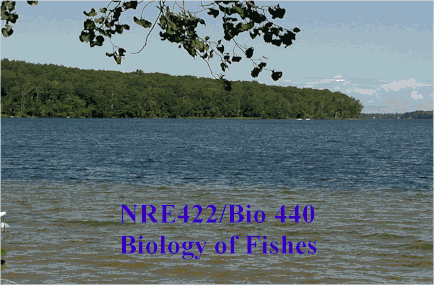

Fall 2001
Instructor: P. W. Webb
Lectures: Tuesday and Thursday, 11:30 to 1 p.m.
Office Hours: Wednesday 1000 to 1130, 166 Dana.
Location: 4212 SEB (School of Education Bldg.).http://www-personal.umich.edu/~pwebb/NRE422-BIO440/BioFishesHome.html
NOTE: NRE 423/BIO 441 Biology of Fishes Lab
is a separate course and does not have to be taken with NRE 422/Bio 440. Students electing the lab course should meet in Chem 1201. Visit the class webpage at www-personal.umich.edu/~thook/nre423bio441Summary
Lectures cover many aspects of the biology of the lower vertebrates, commonly known as fishes, including phylogeny, functional morphology and physiological ecology, reproduction, ecology, and zoogeography. The systematic position of fishes among the vertebrates is discussed and exemplary assemblages examined. Special attention is given to the consequences of the physical properties of water for the form, function, and modes of living of fishes. Each student will complete a research project based on literature review of a question relevant to fishes and of interest to the student.
Material on ecology, fisheries, and management is only introduced briefly. These topics are covered in detail in other courses; Ecology of Fishes, Behavior of Fishes, Fisheries Science, Fishery Management, Aquaculture, and Biology and Ecology of Fishes (at UMBS).
Text Book
Helfman, G. S., Collette, B. B., and Facey, D. E. 1997. The Diversity of Fishes. Blackwell Science.
Research Project
The biology of fishes is an immense subject, a not surprising result for this most speciose group among vertebrates. Therefore, to increase the range of topics covered, and to tailor these to class members, each student will research a topic of interest to themselves, write this up as a term paper, and present it to the class.
You are required to submit a proposal describing your question and why you chose that question. On the basis of this, you may be advised to expand or reduce the scope of your question.
The text of the paper, excluding abstract, figures and references, should be no more than 5 pages (double spaced, 12 point font, 1 inch margins, 1 inch top, and bottom). The paper must be preceded by a 200-word summary. The format of the paper must follow that of a typical journal, for example Transactions of the American Fisheries Society. These journals have instructions to authors (e.g. for Trans. Amer. Fish. Soc. See http://afs.allenpress.com/fitr.pdf ) but also look at typical articles.
You will be required to make a research presentation of your research to the whole class. Attendance at these presentations is mandatory, attendance will be taken, and points lost for absences. A sub-set of students will be required to peer review talks in each session.
The paper and presentation must be your own. Do not copy text from any other source, including internet sources. At most, small pieces of text/figures/tables may be quoted, clearly identified as such, and with complete source information. Any other copying is plagiarism and will result in your receiving a zero grade for this part of the course.
Office Hours
The purpose of office hours is to provide students with an opportunity to explore questions relating to course material, to discuss follow-up courses, etc. My style is Socratic. I try to draw answers from you, from what you already know. Some students do not like this style, but I find it involves students in their own learning so that they better remember and understand the material.
Evaluation and Grading
Evaluation of students is based on two cumulative closed-book hourly exams (maximum of 35% of your grade for each exam) and the research project (maximum of 30% of your grade).
The grading scale is straight: >90% - As, 80-89% Bs, etc.
Grading Disputes
Grading disputes will be handled as follows: If you want any part of your exam/paper re-graded, write the scientific basis for requesting a re-grade on a separate sheet of paper. Return this with your graded paper within ONE week from the date the papers are returned in class. Your request will be evaluated. If a dispute remains unsettled, a meeting will be arranged to discuss the problem. Although instructors are fallible, the instructors decision is final.
Active involvement is a major factor promoting learning. I have found that e-mail does not work well for this. Many e-mail questions prove to be for factual information that is included in the text book, requests because of missed lectures, information given in the course description etc. I expect you to take ownership of your learning by looking up these questions for yourself. Others questions are too detailed, and need to be discussed with the student. I will answer these questions during office hours. In general, I will not answer questions via e-mail.